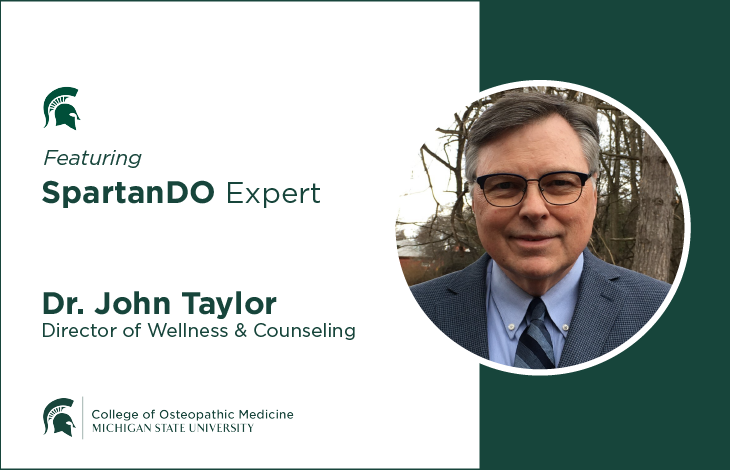SpartanDO Expert Take 2022-05
May 2022
Recovering from post-pandemic distress
Psychologist John Taylor offers advice on adjusting to the transitional phase of the pandemic.

Many leading scientists have declared the U.S. “out of the pandemic phase.” The reality of stepping back into social settings may be easy and welcome for some, while there will be “ambivalence, uncertainty, and fear” for others, according to John Taylor, Psy.D., director of wellness and counseling services at the MSU College of Osteopathic Medicine.
A recent Mental Health America survey found that during the pandemic, the sense of social isolation increased for all age groups, but was most significant among 18–24-year-olds, college students and early professional students. Across screens from all groups, 75% (over 2 million respondents) also reported moderate to severe symptoms of a potential mental health condition in 2020.
May is Mental Health Awareness Month, and Dr. Taylor reflects on perspective-taking, contemplative practices and other suggestions for practitioners and individuals to adjust to the transitional phase of the pandemic.
“People have had an unprecedented period of COVID-related life disruptions, and now many struggle with post-pandemic distress,” Taylor said. “Our mind may sometimes tell us false narratives, thinking that ‘nobody cares about me,’ or ‘things will never get better,’ perpetuating emotional distress and feelings of isolation and loneliness.”
“Find a buddy, mentor, coach or someone you trust. Support and hold each other accountable. Foster human reconnections again.”Taylor suggests the therapeutic practice of perspective-taking. “This cognitive strategy entails taking a step back to pause and consciously challenge how accurate one’s situational narrative is.” He counsels his own students and patients to look constructively at their problems and be proactive about seeking help. “Find a buddy, mentor, coach or someone you trust. Support and hold each other accountable. Foster human reconnections again,” he advises.
Contemplative practices like yoga, mindfulness and meditation can also help with post-pandemic anxiety and social reconnection. He advocates exploring meditative practices either on your own or through other venues, such as free online classes and virtual groups.
Throughout the pandemic, Taylor’s office has provided virtual KORU Mindfulness meditation groups for students. This is an evidence-based program that consists of 75-minute classes for four weeks where participants learn about and practice concepts such as meditation and coping techniques like perspective-taking. This resource will be offered to College of Osteopathic Medicine faculty and staff this fall.
Health care providers are essential proponents for patient mental health and recovery from post-pandemic distress. “We can be hopeful examples in supporting our students, patients and communities,” Taylor said. “Sharing some of my own personal struggles with the pandemic kindles empathy and connection, and lets people know they’re not alone.”
Resources
- Learn more about wellness routines, wellness check-ins, and helping others to help manage stress and feel better.
- Mental health screening | Select from 12 mental health tests, including depression, anxiety, addiction, PTSD, postpartum depression and more, to help determine if you are experiencing symptoms of a mental health condition and if seeking professional help is right for you. Developed by Mental Health America.
- MSU ThrivingCampus | A directory of behavioral health practitioners throughout the state of Michigan curated by MSU.
- Psychology Today | An online, searchable directory of behavioral health practitioners nationwide. Learn more about the practitioner’s philosophical approach, specializations, language capabilities, insurance and more, and even begin a conversation with them. Taylor recommends “doing your homework” and “shopping around” to find the right mental health practitioner for you, because “that relationship is everything.”
- Free, confidential warmlines | If you’re in crisis or just need someone to talk to, speaking with a trained peer on a warmline can provide support during hard times.
- Tools to help you thrive | Developed by Mental Health America.
- Substance use/abuse resources | Developed by Substance Abuse and Mental Health Services Administration.
- Counseling and Psychiatric Services (CAPS) | MSU counseling service for students. After-hours crisis counselor line: 517-355-8270.
- Employee Assistance Program | Support services for MSU faculty and staff.
- MSU Health Care Psychiatry Clinic | Support services available to individuals affiliated with MSU or for the Greater Lansing Community. Call 517-353-3070.
